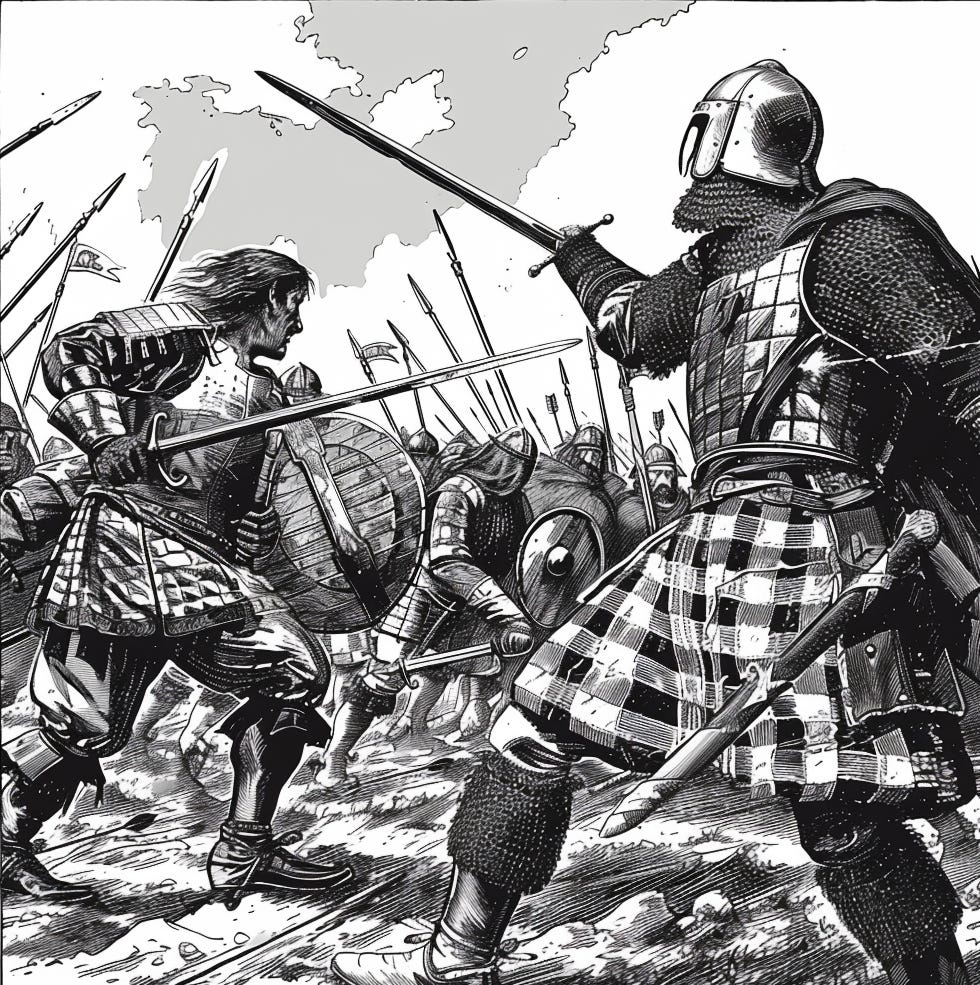The annals of Scottish history are rich with tales that speak volumes of valor, courage, and the indomitable spirit of its warriors, yet few stories resonate as profoundly or are as evocative as the tale of the Battle of Bauge in 1420. This historic confrontation not only marked a significant turning point in the protracted conflict known as the Hundred Years' War between England and France but also underscored the unparalleled bravery of Scottish warriors fighting on foreign soil. Among these brave hearts was a member of the Buchanan family, Sir Alexander Buchanan, whose singular act of heroism at Bauge has become a source of immense pride and a celebrated part of Buchanan lore to this day.
The Prelude to Battle
In the turbulent early years of the 15th century, the English crown, under the ambitious Henry V, embarked on a campaign of conquest in France that saw them capturing key territories and fortresses with an army that was considered invincible by many. In a desperate bid to stem the English advance, Charles VII of France reached out to his allies for support, seeking the prowess of Scottish arms, renowned for their tenacity and martial skill. The Scottish response was formidable, a force of 10,000 men-at-arms led by the stalwart Earl of Buchan. Among these warriors was Sir Alexander Buchanan, a figure destined to carve his name into the very heart of this historic battle.
The Battle Unfolds
The Battle of Bauge unfolded on the banks of the River Couesnon, in a scenario that initially seemed to favor the English, buoyed by their recent string of victories. The Scots, however, had the element of surprise firmly on their side, a strategic advantage they did not squander. Launching into the fray with a vigor that caught the English unawares, the Scottish force made it clear that they were a force to be reckoned with. In the thick of this chaos, Sir Alexander Buchanan emerged as a beacon of courage and determination. Spotting the Duke of Clarence, a key English commander and brother to Henry V, Buchanan seized the moment. With a combination of sheer bravery, martial prowess, and perhaps a touch of fate, Buchanan engaged the Duke in combat. The encounter was fierce, but Buchanan's resolve was fiercer, culminating in the defeat of the Duke, a moment that significantly shifted the tide of battle in favor of the Franco-Scottish alliance.
The repercussions of the Battle of Bauge reverberated far beyond the battlefield, serving as a symbolic and strategic blow against English ambitions in France. The victory, with Sir Alexander Buchanan's defeat of the Duke of Clarence at its heart, was more than a military triumph; it was a statement of the unwavering bravery and skill of Scottish warriors. Buchanan's heroic deed earned him not just the admiration of his peers but tangible recognition in the form of a golden coronet, a symbol of honor that he later sold, embedding his act of valor in the annals of history and legend alike. This battle rejuvenated the French in their struggle against English dominion and cemented the Auld Alliance between Scotland and France. For the Buchanan family, this event was a shining moment that highlighted their commitment to the principles of bravery, honor, and the enduring legacy of the Scottish warrior tradition.
Conclusion
The Battle of Bauge stands as a testament to the unpredictable nature of warfare and the profound impact that individual acts of heroism can have on the outcome of battles and the course of history. Sir Alexander Buchanan's remarkable feat is not just a story of courage in the face of overwhelming odds; it is a beacon of inspiration that illuminates the values of bravery, sacrifice, and the relentless pursuit of justice. As we reflect on the pages of history, we are reminded of the Buchanans' enduring contribution to Scotland's storied past and the timeless lessons of valor that continue to inspire generations.





